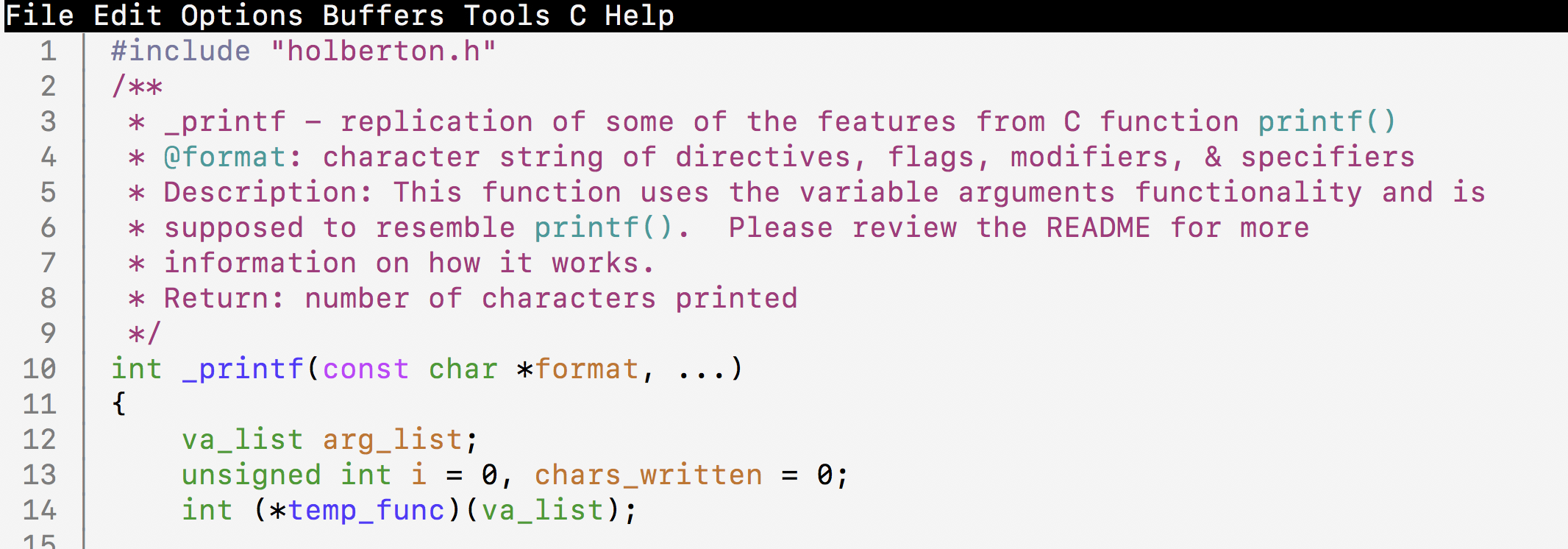printf
Custom version of printf() in C Language
_printf()

Description
This Repo has has all the code necessary for our (David John Coleman II and
Joann Vuong’s) custom function called _printf(). It is a mini-version of C
Language function printf() from stdio.h, and our function _printf()
attempts to replicate the exact same process as the C function printf().
This project was completed as a part of the curriculum for a software development program.
C language standard functions used
write,malloc,free,va_start,va_end,va_copy,va_arg
Brief Synopsis
_printf() function takes 2 arguments: a character pointer to a string:
format, and a ‘variable arguments list’: arg_list. _printf() loops
through the format string searching for a conversion specifier, which is
indicated with the ‘%’ symbol. If found, the match_specifier() function
loops through an array of structs (contianing character and function pairs) to
find the specifier function that is matched with the given conversion specifier
from the format string, and then returns a pointer to that paired function.
_printf() uses the pointer to that specifier function to call the specifier
function on the next queued argument from the arg_list. Each specifier
function writes a character one at a time as determined from the value in
arg_list. In the buffer branch and in the ‘release: v0.1’, our code writes
the characters from the format string and the associated specifiers to the
buffer, and in the ‘no-buffer’ branch, our code is instead written to standard
output one at a time.
Usage
The directory contents should be compiled with the following command:
$ gcc -Wall -Werror -Wextra -pedantic *.c
_printf() function may be used, in any C language program. This is the
prototype:
_printf(const char *[FORMAT], ...)
FORMAT refers to a string with any number of specifiers followed by a ‘%’
symbol. i.e. "My name is %s and I am %d years old". … refers to a
list of variadic (variable arguments in C Language), which can be any number of
variables of any type. With the above example string, appropriate arguments
could be "Edwin Abbott Abbott", 179. These examples together should be called
like so:
_printf("My name is %s and I am %d years old", "Edwin Abbott Abbott", 179)
File List
- For a brief explanation of each file, please see the file
./FILELIST.md
Tests
To run tests, to check the overall functionality of the program, compile
with main.c as the main file:
$ cp dev/main.c .
$ gcc *.c
To run tests to check that the code compiles correctly, run the following bash
script. This script uses the -Warning flags from the usage section.
$ ./dev/init.sh
Authors
David John Coleman II - http://www.davidjohncoleman.com/
Joann Vuong - https://github.com/jvpupcat
License
MIT License